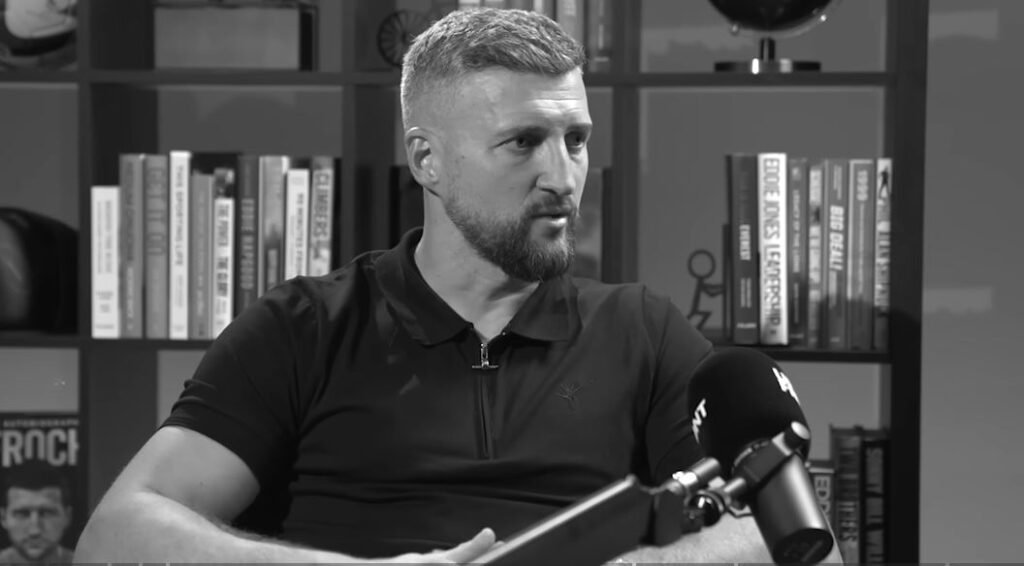
With an estimated net worth of $20 million, Carl Froch is a fighter whose career was based on perseverance, accuracy, and an unwavering work ethic. Froch was a master of controlled chaos, transforming every punch into both spectacle and strategy. He was well-known for his unbreakable chin and calculated aggression. Years after his last battle, his tale of financial self-control and emotional fortitude is still incredibly motivating.
Froch was born into a modest family in Nottingham, and his early goals were more focused on football boots than boxing gloves. He still fervently supports Nottingham Forest, the local team he dreamed of playing for as a child. However, fate changed his course. He ended up in the Phoenix ABC gym at the age of nine, where he would begin building a legacy that would eventually bring in millions of dollars. His amateur career demonstrated a keen combination of stamina and tactical awareness, which paid off with two ABA titles and a bronze at the 2001 World Championships, indicating a bright future in professional competition.
| Category | Details |
|---|---|
| Full Name | Carl Martin Froch |
| Nickname | “The Cobra” |
| Date of Birth | July 2, 1977 |
| Birthplace | Nottingham, England |
| Height | 6 ft 1 in (185 cm) |
| Reach | 75 in (191 cm) |
| Weight Class | Super Middleweight |
| Professional Career | 2002 – 2014 |
| Record | 33 Wins (24 by KO), 2 Losses |
| Major Titles | WBC, WBA, IBF, WBO Super Middleweight Champion |
| Estimated Net Worth (2025) | $20 Million (Approx. £16 Million) |
| Major Earnings | £8–10 Million for George Groves Rematch (Wembley, 2014) |
| Current Occupation | Boxing Analyst and Commentator, Sky Sports |
| Honors | MBE (2015), International Boxing Hall of Fame (2023) |
When Froch made his professional debut in 2002, he entered the ring with a calculated and electrifying energy. He was extremely versatile and had a raw style that allowed him to outlast opponents who underestimated his stamina. He defeated Jean Pascal to win the WBC Super Middleweight Championship, his first major title, within six years. Fans witnessed the fierce and exhausting fight that would later become Froch’s signature: an unwavering will in the face of adversity.
Froch’s bank account grew much more quickly than his already remarkable record as his career took off. In terms of money and reputation, his involvement in Showtime’s “Super Six” World Boxing Classic turned into a turning point. The seven-figure salaries Froch received from competing against top fighters like Andre Ward and Mikkel Kessler solidified his financial security. These fights, which were frequently fought abroad, demonstrated his capacity to step outside of his comfort zone, a mindset that helped him become more marketable.
By the early 2010s, Froch’s income was commensurate with his increasing prominence. According to reports, his rematch with Kessler earned about £2 million, but his feud with George Groves completely changed his financial trajectory. Their rivalry, which was equal parts athletic and dramatic, culminated in the 2014 Wembley Stadium rematch, which drew a record-breaking 80,000 spectators and was one of the biggest spectacles in British boxing.
Froch’s right-hand knockout that evening sent shockwaves through boxing history. In addition to being physically decisive, the punch was incredibly successful in securing his status as one of the best in the sport. One of the wealthiest nights in British boxing history, the event brought in over £20 million, with Froch taking home between £8 and £10 million. The triumph also represented a poetic conclusion to his career—the ideal fusion of sentimentality, sportsmanship, and showmanship.
Froch made a smooth transition into broadcasting after retiring in 2015. He was one of Sky Sports’ most captivating commentators because of his keen wit and unwavering honesty. His delivery, which frequently combines humor and insight, is remarkably clear whether he is evaluating strategies or recollecting his own conflicts. Additionally, he has established himself as a well-known figure in British sports culture. He keeps his presence current and entertaining by occasionally verbally sparring with other fighters like Jake Paul.
Even though Froch is well-known and wealthy, his thoughts on wealth are surprisingly realistic. “My net worth is $20 million, according to Wikipedia,” he stated in a 2020 interview with MailOnline. It’s pretty accurate, though I’m not sure where they get that. He did, however, add quickly that “money isn’t everything.” My children and my health are my wealth. This sentiment reveals a man who values both financial success and emotional stability, which is a balance that many retired athletes find difficult to achieve.
His public persona gained a romantic touch with his marriage to model Rachael Cordingley, whom he proposed to in the ring following his victory over Groves. Froch frequently refers to their 2019 wedding in Italy as “the biggest event” of his life, saying it was far more significant than any title match. They are raising three kids together, which Froch often refers to as his “greatest victory” in his family life.
In terms of money, Froch has managed his earnings very effectively. In order to maintain his wealth, he diversified into real estate, investing in homes all over the United Kingdom and pursuing a few chosen business endeavors. Because of his foresight and self-control, Froch’s financial situation has remained remarkably stable, in contrast to many fighters whose fortunes declined after retirement.
Froch’s contributions were officially acknowledged in 2023 when he was admitted into the International Boxing Hall of Fame, joining the ranks of legendary fighters like Joe Calzaghe, whom he had never faced but frequently admired. His readiness to admit that Calzaghe “may have beaten me on points” betrays a humility that supports his self-assurance, a unique quality that characterizes the character of real champions.
Froch’s tale has grown more motivational over time for young athletes, serving as an illustration of how emotional intelligence and strategic perseverance can coexist. His post-boxing life exemplifies a unique kind of triumph: one determined by fulfillment rather than notoriety or wealth. “I wake up with my kids and take them to school, and that’s what wealth really is,” he once remarked.
